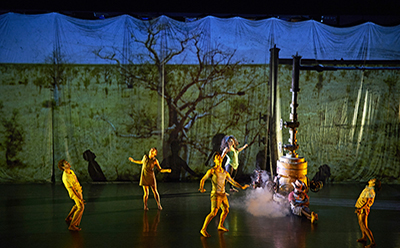 In a new partnership with the University of Melbourne, Arts House will present Performing Climates – a curated public arts and cultural program, which will run alongside and in conjunction with the Performing Studies International (PSi) conference in July 2016.
In a new partnership with the University of Melbourne, Arts House will present Performing Climates – a curated public arts and cultural program, which will run alongside and in conjunction with the Performing Studies International (PSi) conference in July 2016.
“Artists, activists, scientists and citizens are all collaborating to radically reimagine, reconfigure and research how and where art intersects with climate change; and our capacity to respond to, prepare for and mitigate it,” says Arts House artistic director, Angharad Wynne-Jones.
“Performing Climates explores these themes with five major projects, along with a series of discussions, dinners and dancing – because even as we face global climate catastrophe, we can and must experience joy, connectedness and sustenance.”
Open to the public, Performing Climates will include Marrugeku Theatre’s large-scale work: Cut the Sky – which tells the stories of the devastating impact on Western Australia’s environment and Indigenous communities; and Refuge – an artist led rehearsal of Arts House’s role in the event of a climate catastrophe at the North Melbourne Town Hall, which is a designated community relief centre for the area.
Other programs featured in Performing Climates include a part-game/part-performance investigating the interplay of natural and human-made systems; an environmental installation and lament for Australia’s landscape; and a tender invitation to touch the rising oceans of the Pacific.
Best Festival Ever: How to Manage a Disaster
North Melbourne Town Hall: 5 – 10 July 2016
We are surrounded by and embedded in systems, both natural and human-made – from climate and the ecosystem to the economy or even society itself. Many of today’s significant issues emerge from the interplay between such systems. Taking systems science as its basis, Best Festival Ever is both interactive and performative – part theatre show, part performance lecture and part board game. Its audience gathers around a table, working together to deliver a unique music festival, from planning to execution, and doing their best to prevent the system from collapsing into chaos.
And the Earth Sighed
North Melbourne Town Hall: 6 – 10 July 2016
In an immersive audiovisual installation that re-imagines the relationship between nature and culture, Josephine Starrs and Leon Cmielewski configure the land itself as active, not neutral, and able to speak about our human impacts upon it. Using imagery captured by drones, detailed aerial views of Australian landscapes and waterways are dynamically manipulated in ways that reveal their underlying fragility; while Alex Davies’ surround soundscape invites contemplation of the impact of climate change on natural ecologies.
Cut the Sky
Meat Market, North Melbourne: 6 – 10 July 2016
In a burnt landscape a group of climate change refugees faces yet another extreme weather event. Propelled back and forward in time, they revisit conflict with mining companies, the destruction of fauna and the relegation of the marginalised, while contemplating the gift of life and the life-giving force of the sun. Dance, video, poetry and song are breathtakingly combined in a major new work from intercultural and interdisciplinary company, Marrugeku.
Enfold
North Melbourne Town Hall: 6 – 10 July 2016
The rising waters of the Pacific and increased displacement of Pacific Islanders provide the impetus for Enfold – a poetic contemplation of water and our relationship to it. An installation and ritual performance from the deeply experienced and richly talented team of Jade Dewi Tyas Tunggal, Ria Soemardjo and Paula van Beek, Enfold explores themes of tidal shorelines, relocation and shelter. It invokes an ancient way of seeing, in which deep interconnections are revealed between the microcosmic realms of the human body and the macrocosmic, mystical universe.
Refuge
North Melbourne Town Hall: 9 – 10 July 2016
How should cultural spaces respond to catastrophic emergencies? How can we ensure that we and our communities are prepared, and that we understand and fulfil our role as a local resource? What role should the arts, and artists, play in planning for such events? Central to the Performing Climates program is Refuge: a research–action event in which artists and disaster management professionals work with the North Melbourne community to devise responses to a climactic disaster. It configures North Melbourne Town Hall, home of Arts House, as a place of community refuge.
For more information about the Performing Climates program, visit: www.artshouse.com.au For more information about the Performing Studies International conference visit: www.psi2016.com for details.
Image: Marrugeku Theatre’s Cut the Sky – photo by Jon Green
